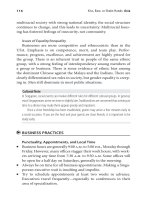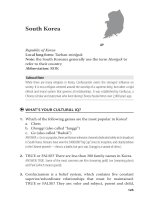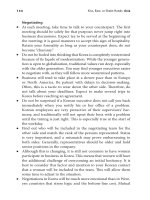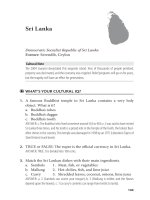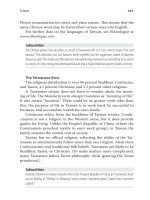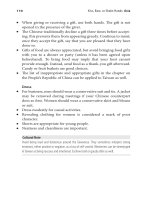How to Do Business in 12 Asian Countries 22
Bạn đang xem bản rút gọn của tài liệu. Xem và tải ngay bản đầy đủ của tài liệu tại đây (134.13 KB, 9 trang )
170
Kiss, Bow, or Shake Hands: Asia
●
When giving or receiving a gi, use both hands. e gi is not
opened in the presence of the giver.
●
e Chinese traditionally decline a gi three times before accept-
ing; this prevents them from appearing greedy. Continue to insist;
once they accept the gi, say that you are pleased that they have
done so.
●
Gis of food are always appreciated, but avoid bringing food gis
with you to a dinner or party (unless it has been agreed upon
beforehand). To bring food may imply that your host cannot
provide enough. Instead, send food as a thank-you gi aerward.
Candy or fruit baskets are good choices.
●
e list of inappropriate and appropriate gis in the chapter on
the People’s Republic of China can be applied to Taiwan as well.
Dress
●
For business, men should wear a conservative suit and tie. A jacket
may be removed during meetings if your Chinese counterpart
does so rst. Women should wear a conservative skirt and blouse
or suit.
●
Dress modestly for casual activities.
●
Revealing clothing for women is considered a mark of poor
character.
●
Shorts are appropriate for young people.
●
Neatness and cleanliness are important.
Cultural Note
Avoid being loud and boisterous around the Taiwanese. They sometimes interpret strong
emotions, either positive or negative, as a loss of self-control. Westerners can be stereotyped
in Taiwan as being raucous and emotional. Eschew lurid or gaudy attire as well.
171
ailand
Kingdom of ailand
Former: Siam
Cultural Note
Thailand is the only country in Southeast Asia never to have been a European colony. The
country consistently remained free of European rule (a point of great national pride to the
Thais). Thailand signed trade treaties with both France and Britain under the rule of King
Mongkut and his son, King Chulalongkorn. By playing France and England off against each
other, the Thai kings kept their country free. The name “Thai” means “free.”
●
3
WHAT’S YOUR CULTURAL IQ?
1.
A wai is:
a. A spicy dish made with peppers and rice
b. An inquiry
c. A form of greeting
ANSWER: c. A wai is the beautiful Thai greeting which is a combination of hands pressed
together and a slight bow. Foreigners are not generally expected to know how to perform it
correctly—but an attempt is appreciated.
2.
Many of ailand’s cities celebrate Songkran, which is a San-
skrit word that refers to the orbit of the sun moving into Aries.
It marks the beginning of a new solar year—the ai New Year.
TRUE or FALSE: e celebrations usually involve throwing water
on people.
ANSWER: TRUE. From sprinkling water on statues of Buddha, to (politely!) dousing friends
with buckets of water, Thais enthusiastically celebrate Songkran over several days in April. It
is a cleansing, purifying holiday that Thais use to mark a new beginning, start fresh, and to
give thanks.
172
Kiss, Bow, or Shake Hands: Asia
3.
ailand’s currency is the:
a. baht
b. dong
c. rupee
ANSWER: a. The baht’s currency code is THB. (Vietnam uses the dong, and Nepal and India
use the rupee)
●
3
TIPS ON DOING BUSINESS IN THAILAND
●
ailand advertises itself as “e Land of Smiles,” and the ai peo-
ple are genuinely friendly and polite. But their extreme politeness
vanishes as soon as they get behind the wheel of a car. Driving is
aggressive, and pedestrians seem to be fair game. Be very cautious
every time you cross a street; use an overhead walkway if possible.
●
Because of travel diculties in large ai cities, many foreign
executives plan on making only two meetings per day. e grid-
lock in Bangkok is so bad that many ai businesspeople con-
duct business from their cars, with cell phones, laptops, and fax
machines. (Remember that Bangkok and other ai cities have
passenger service on canals. When the street trac is stalled, con-
sider commuting by boat.)
●
English is oen spoken by ai executives. For those who do not
speak English, a translator is usually close at hand. Note that taxi
drivers do not usually speak English. To arrive at your destina-
tion, have the street address written down in ai, plus the name
of the nearest major cross street.
●
Entertaining is part of developing business relationships. ais
place great value on enjoyment (kwam sanuk). Laughter comes
easily to ais, and a foreigner can minimize his or her inevitable
errors by laughing at them. Laughter can also be used to cover
embarrassment.
●
Giving gis will help create a good rst impression. A bottle of
imported liquor (such as single malt Scotch) is appropriate for an
executive. Have the gi-wrapped locally, and do not be dismayed
if the gi is immediately set aside—ais do not open gis in
the presence of the giver. Some executives recommend giving a
small gi to the oce receptionist or secretary as well, like food
or candy that can be shared with the rest of the oce sta.
●
3
COUNTRY BACKGROUND
Demographics
ailand has a population of about 65 million (2006 estimate).
Approximately 10 percent of the population lives in Bangkok, the
country’s capital and largest city. About 75 percent of the people are
ethnic ais, 14 percent are Chinese, and the remaining 11 percent
are a mixture of other Asians and non-Asians.
History
Like other countries of Southeast Asia, ailand was peopled in
prehistoric times through successive migrations from central Asia.
Evidence of Bronze Age civilizations in northeast ailand illustrate
a high level of technology achieved by prehistoric people in South-
east Asia.
During the eleventh century, the ai people began migrating
from southern China. (Some research indicates that they were forced
out by the Han Chinese.)
From the thirteenth century to the early twentieth century, the
country was called Siam. e name was changed to ailand in
1939.
ailand was ruled by an absolute monarchy until a group of
foreign-educated ais directed a military and civilian coup d’etat in
June of 1932 and replaced the absolute monarchy with a constitu-
tional monarchy. e current nation can be dated to that period.
In 1941 Japan occupied ailand. Aer World War II, ailand
followed a pro-Western foreign policy.
Since the Second World War, a balance of power has been estab-
lished between the military and the civilian leaders, with the king
occasionally mediating. Whenever the military has felt threatened,
it seized power. is has become more dicult as a growing political
consciousness has developed in the ai people. e ais hope that
the days of military coups are now over.
Thailand
173
174
Kiss, Bow, or Shake Hands: Asia
In 2005 Dr. aksin’s ai Rak ai Party was re-elected, winning
ailand’s parliamentary election with an overwhelming majority.
One major challenge he faced was an insurgency of Muslims in the
southern provinces.
His viewpoint on resolving the conict was to reduce government
funds and increase military force in the separatists’ villages. Dissatis-
faction with aksin’s policies led to the ouster of his government by
a military-led coup in September 2006.
Type of Government
e Kingdom of ailand is a constitutional monarchy.
ailand has a prime minister and a parliament with two legisla-
tive houses, but their power has been limited by the military. Mem-
bership in the lower house is by election, but in the upper house it
is by appointment, and the military is well represented. As of this
writing it is uncertain how ailand’s form of government will be
aected by the military coup of September 2006.
Current government data can be found at the Embassy of ai-
land at www.thaiembdc.org.
Language
ai, which is linguistically related to Chinese, is the ocial lan-
guage. Other languages are spoken, including Chinese, Lao, Khmer,
and Malay. e literacy rate is 89 percent.
Cultural Note
Thai is a complex language with five different tones. While this makes it difficult for Westerners
to speak, Thais will appreciate a foreigner who takes the time to learn even a few phrases in
Thai. There are only eight possible consonants that a word in Thai may end with: p, t, k, m, n,
ng, w, and y. Consequently, when Thais speak English, they have trouble with words that end
in other sounds. English words ending in l tend to be shifted to the n sound; for example, the
word “Oriental Hotel” is pronounced “Orienten Hoten.” And, because the s sound is not used in
endings, Thais tend to leave the s off of pluralized words. The Thai alphabet is similar to the
alphabets used in Burmese and Laotian scripts. Thai is written from left to right. Adding to the
difficulty for Westerners, there are no spaces between individual words.



